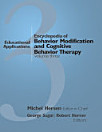Issues in Diagnostic Research
Michel Hersen · Cynthia G. Last
dec. 2012 · Springer Science & Business Media
Carte electronică
360
Pagini
reportEvaluările și recenziile nu sunt verificate Află mai multe
Despre această carte electronică
Prior and subsequentto the publication of the third edition of the Diagnos tic and Statistical Manual of Mental Disorders (DSM-III), we have witnessed a considerable upsurge in the quantity and quality of research concerned with the psychiatric diagnostic process. There are several factors that have contributed to this empirical influx, including improved diagnostic cri teria for many psychiatric disorders, increased nosological attention to childhood psychopathology, and development and standardization of several structured diagnostic interview schedules for both adult and child populations. With the advent of DSM-III-R, and in anticipation of DSM-IV, diagnostic labels and their definitions have been in a state of change, as evinced by the many refinements and modifications currently taking place. However, the basic purpose or raison d'etre of the nosological scheme has not been altered. Psychiatric diagnosis is the means by which we classify or categorize human psychopathology. And, as is the case in the medical arena, psychiatric diagnosis serves three central functions: classification. communication. and prediction. As research accumulates, our understanding of psychiatric disorders increases, and we are in a much better position to classify reliably and with validity, as well as to com municate and predict Despite periodic changes in the diagnostic system, the basic strategies for conducting diagnostic research (e. g. , genetic-family studies, biological markers, follow-up studies, etc. ) do not vary appreciably over time. But in over one decade no scholarly book has appeared that tackles the essential research issues involved in upgrading the diagnostic endeavor.
Evaluează cartea electronică
Spune-ne ce crezi.
Informații despre lectură
Smartphone-uri și tablete
Instalează aplicația Cărți Google Play pentru Android și iPad/iPhone. Se sincronizează automat cu contul tău și poți să citești online sau offline de oriunde te afli.
Laptopuri și computere
Poți să asculți cărțile audio achiziționate pe Google Play folosind browserul web al computerului.
Dispozitive eReader și alte dispozitive
Ca să citești pe dispozitive pentru citit cărți electronice, cum ar fi eReaderul Kobo, trebuie să descarci un fișier și să îl transferi pe dispozitiv. Urmează instrucțiunile detaliate din Centrul de ajutor pentru a transfera fișiere pe dispozitivele eReader compatibile.





